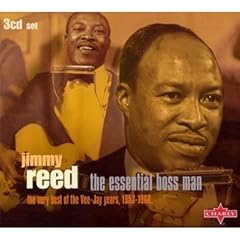Home » Jazz Musicians » Jimmy Reed
Jimmy Reed
Blues music has had its individualist performers with powerful, poetic feeling, tremendous instrumental virtuosity, or a unique sound. But if the tradition ever had its Everyman, it would be Jimmy Reed, the most popular Chicago blues performer of the 1950s and early 1960s. Jimmy Reed had a guitar technique that rarely varied, and his vocals were relaxed to the point where hearers couldn't always understand the words he sang. Yet Reed found a groove and stuck to it, creating a sound that any blues fan could identify after hearing only a few seconds of his music. That sound, moreover, influenced nearly every rock music ensemble that had a blues element in its style. Reed's music distilled the essence of the blues. Reed's life followed a course outwardly similar to those of many other Chicago bluesmen. Mathis James Reed was born in the Mississippi River Delta, in or near Leland, Mississippi, on September 6, 1925, and he and his nine siblings grew up working the fields on a sharecroppers' plantation. Reed and his childhood friend Eddie Taylor, who would later play in Reed's band, taught themselves to play the guitar and harmonica whenever they could get away from farm work. But Reed's main musical activity when he was young consisted of singing in church choirs. Reed dropped out of school in his early teens to work the fields full time in nearby Duncan and Meltonia, Mississippi. The entry of the United States into World War II brought news of factory jobs in Chicago to the Delta, and Reed followed countless other young people northward. But after a short time in Chicago he was drafted into the Navy himself. After his discharge in 1945 he returned to Mississippi, where he married and, with his wife Mary, raised a family of eight children. Mary, who would become known as "Mama" Reed, would go on to compose many of his most popular songs. By 1948 the couple was living in Gary, Indiana, and Reed was working in a steel mill. Later he worked as a butcher at the Armour Corporation's meatpacking plant. After the experience of living in Chicago, however, Reed had become more and more interested in playing the guitar. Reed bought an electric guitar and amplifier and began practicing in the alley behind his house. He honed his style by recording his own sessions on blank 78 rpm discs with a crude recording machine and listening critically to the results.
Read moreTags
Jimmy Reed - Black Blues Series: The Best of Jimmy Reed (1977)

Source:
Something Else!
By Nick DeRiso Back then, you had to go to the record store, and look through this big catalog. I wanted to buy my father some of his music, something that would resonate, to show him I'd grown up to the point of buying a good gift. I ran my finger down the list of names, page after page after page of singers I had never heard of. Then I found it, and the words jumped out like a thunderclap: ...
read more






















